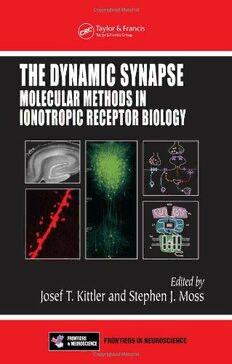Download The Dynamic Synapse: Molecular Methods in Ionotropic Receptor Biology (Frontiers in Neuroscience) PDF Free - Full Version
Download The Dynamic Synapse: Molecular Methods in Ionotropic Receptor Biology (Frontiers in Neuroscience) by Josef T. Kittler, Stephen J. Moss in PDF format completely FREE. No registration required, no payment needed. Get instant access to this valuable resource on PDFdrive.to!
About The Dynamic Synapse: Molecular Methods in Ionotropic Receptor Biology (Frontiers in Neuroscience)
Exploring the diverse tools and technologies used to study synaptic processes, The Dynamic Synapse: Molecular Methods in Ionotropic Receptor Biology delineates techniques, methods, and conceptual advances for studying neurotransmitter receptors and other synaptic proteins. It describes a broad range of molecular, biochemical, imaging, and electrophysiological approaches for studying the biology of synapses. Specific topics include the use of proteomics to study synaptic protein complexes, the development of phosphorylation state specific antibodies, post-genomic tools applied to the study of synapses and RNA interference in neurons. In addition, several chapters focus on methods for gene and protein delivery into neuronal tissue. The use of biochemical, electrophysiological and optical tagging techniques to study the movement and membrane trafficking of neurotransmitter receptors in the membrane of live nerve cells are also discussed. To complement these approaches, the application of approaches for achieving long-term alterations in the genetic complement of neurons in vivo using viral vectors or homologous recombination of ES cells are also described.
Detailed Information
| Author: | Josef T. Kittler, Stephen J. Moss |
|---|---|
| Publication Year: | 2006 |
| ISBN: | 9780849318917 |
| Pages: | 325 |
| Language: | English |
| File Size: | 6.878 |
| Format: | |
| Price: | FREE |
Safe & Secure Download - No registration required
Why Choose PDFdrive for Your Free The Dynamic Synapse: Molecular Methods in Ionotropic Receptor Biology (Frontiers in Neuroscience) Download?
- 100% Free: No hidden fees or subscriptions required for one book every day.
- No Registration: Immediate access is available without creating accounts for one book every day.
- Safe and Secure: Clean downloads without malware or viruses
- Multiple Formats: PDF, MOBI, Mpub,... optimized for all devices
- Educational Resource: Supporting knowledge sharing and learning
Frequently Asked Questions
Is it really free to download The Dynamic Synapse: Molecular Methods in Ionotropic Receptor Biology (Frontiers in Neuroscience) PDF?
Yes, on https://PDFdrive.to you can download The Dynamic Synapse: Molecular Methods in Ionotropic Receptor Biology (Frontiers in Neuroscience) by Josef T. Kittler, Stephen J. Moss completely free. We don't require any payment, subscription, or registration to access this PDF file. For 3 books every day.
How can I read The Dynamic Synapse: Molecular Methods in Ionotropic Receptor Biology (Frontiers in Neuroscience) on my mobile device?
After downloading The Dynamic Synapse: Molecular Methods in Ionotropic Receptor Biology (Frontiers in Neuroscience) PDF, you can open it with any PDF reader app on your phone or tablet. We recommend using Adobe Acrobat Reader, Apple Books, or Google Play Books for the best reading experience.
Is this the full version of The Dynamic Synapse: Molecular Methods in Ionotropic Receptor Biology (Frontiers in Neuroscience)?
Yes, this is the complete PDF version of The Dynamic Synapse: Molecular Methods in Ionotropic Receptor Biology (Frontiers in Neuroscience) by Josef T. Kittler, Stephen J. Moss. You will be able to read the entire content as in the printed version without missing any pages.
Is it legal to download The Dynamic Synapse: Molecular Methods in Ionotropic Receptor Biology (Frontiers in Neuroscience) PDF for free?
https://PDFdrive.to provides links to free educational resources available online. We do not store any files on our servers. Please be aware of copyright laws in your country before downloading.
The materials shared are intended for research, educational, and personal use in accordance with fair use principles.

